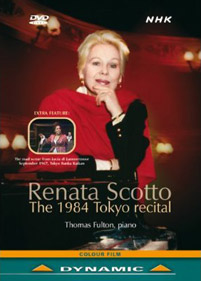La grande cantatrice Renata Scotto n'est plus à présenter. Née en 1934 dans la petite ville ligurienne de Savone près de Gênes, elle a interprété plus de 45 opéras différents. À onze ans, elle veut passer une audition et c'est à l'âge de quinze ans qu'elle affronte le public avec l'air d'Azucena du Trouvère de Verdi « Stride la vampa ». À seize ans, elle étudie le chant à Milan avec comme professeurs, Ghirardini, Merlini. Alfredo Kraus met en rapport Renata avec son professeur de chant, la grande soprano espagnole Mercedes Llopar. À 19 ans, elle remporte son premier concours de chant à Milan parmi un millier de concurrents. Le 2 juillet 1953, elle fait ses débuts au Théâtre Nuovo de Milan en interprétant le rôle de Violetta de La Traviata. C'est au Festival d'Edimbourg, le 3 septembre 1957, qu'elle obtient la gloire en remplaçant Maria Callas qui refusa de participer à une cinquième représentation, dans le rôle d'Amina, de La Somnambula de Bellini. Pour la jeune cantatrice, ce fut la chance de sa vie. Elle n'a que 24 ans. Elle devient une grande vedette internationale et se produit sur les plus grandes scènes du monde. En 1960, à Chicago, elle est acclamée dans le rôle de Mimi de La Bohème de Puccini. En 1962, au Covent Garden puis au Metropolitan Opéra le 13 octobre 1965 où elle remporte un grand succès en Cio-Cio-San dans Madame Butterfly de Puccini également. Pendant plus de quarante années, elle est connue pour ses exécutions de Violetta dans La Traviata, Cio-Cio-San dans Madama Butterfly, Mimi dans la Bohême, Lucia de Lammermoor de Gaetano Donizetti, Macbeth de Verdi. Ce splendide récital donné en 1984 à Tokyo montre une Renata Scotto en pleine forme, enchaînant, accompagné au piano par Thomas Fulton, des airs de Handel, Scarlatti, Rossini, Verdi, Liszt, Respighi, Mascagni et Puccini (avec quatre rappels). C'est dire que l'on est comblé par la perfection du chant de cette soprano. Tessiture impressionnante, puissance de la voix, et maîtrise du vibrato, elle reste exceptionnelle, y compris dans l'interprétation. D'une rare beauté. Et il y a plus de vingt ans de cela !
Yannick Rolandeau The great singer Renata Scotto needs no introductions. Born in 1934 in the small Ligurian town of Savone near Genova, she has interpreted more than forty-five different operas. At age eleven, she auditioned and at fifteen sang Azucena's air "Stride la vampa" from Verdi's La Traviata for the first time in public. At sixteen, she studied singing in Milan under Ghirardini and Merlini. Alfredo Kraus recommended Renata to his professsor of singing; the great Spanish soprano Mercedes Llopar. At nineteen, she won her first singing contest in Milan among a thousand competitors. She made her début at Milan's Théâtre Nuovo on July 2, 1953, interpreting the role of Violetta in La Traviata. It was at the Edimbourg Festival on September 3, 1957 that she became famous for replacing Maria Callas, who refused to participate in the fifth performance of Bellini's La Somnambula in the role of Amina. For the young singer, it was the opportunity of a lifetime. She was just twenty-four. She became a great international star and performed on the world's greatest stages. In 1960, in Chicago, she was acclaimed for the role of Mimi in Puccini's La Bohème. In 1962 at the Covent Garden then at the Metropolitan Opera on October 13, 1965 she was highly successful as Cio-Cio in Puccini's Madame Butterfly. During more than forty years, she was known for her interpretations as Violetta in La Traviata, Cio-Cio-San in Madame Butterfly, Mimi in La Bohème, in Lucia de Lammermoor by Gaetano Donizetti, and in Verdi's Macbeth. This splendid recital, with Thomas Fulton accompanying her on the piano, given in 1984 in Tokyo displays a Renata Scotto in fine form, singing airs from Handel, Scarlatti, Rossini, Verdi, Liszt, Respighi, Mascagni and Puccini (and four encores). Which goes to show how much the public was overwhelmed by the singing perfection of this soprano. With an impressive range, vocal power, and control of vibrato, she is exceptional in her interpretation. What rare beauty from over twenty-five years ago!
Translation Lawrence Schulman | Disponible sur |  |
|  |